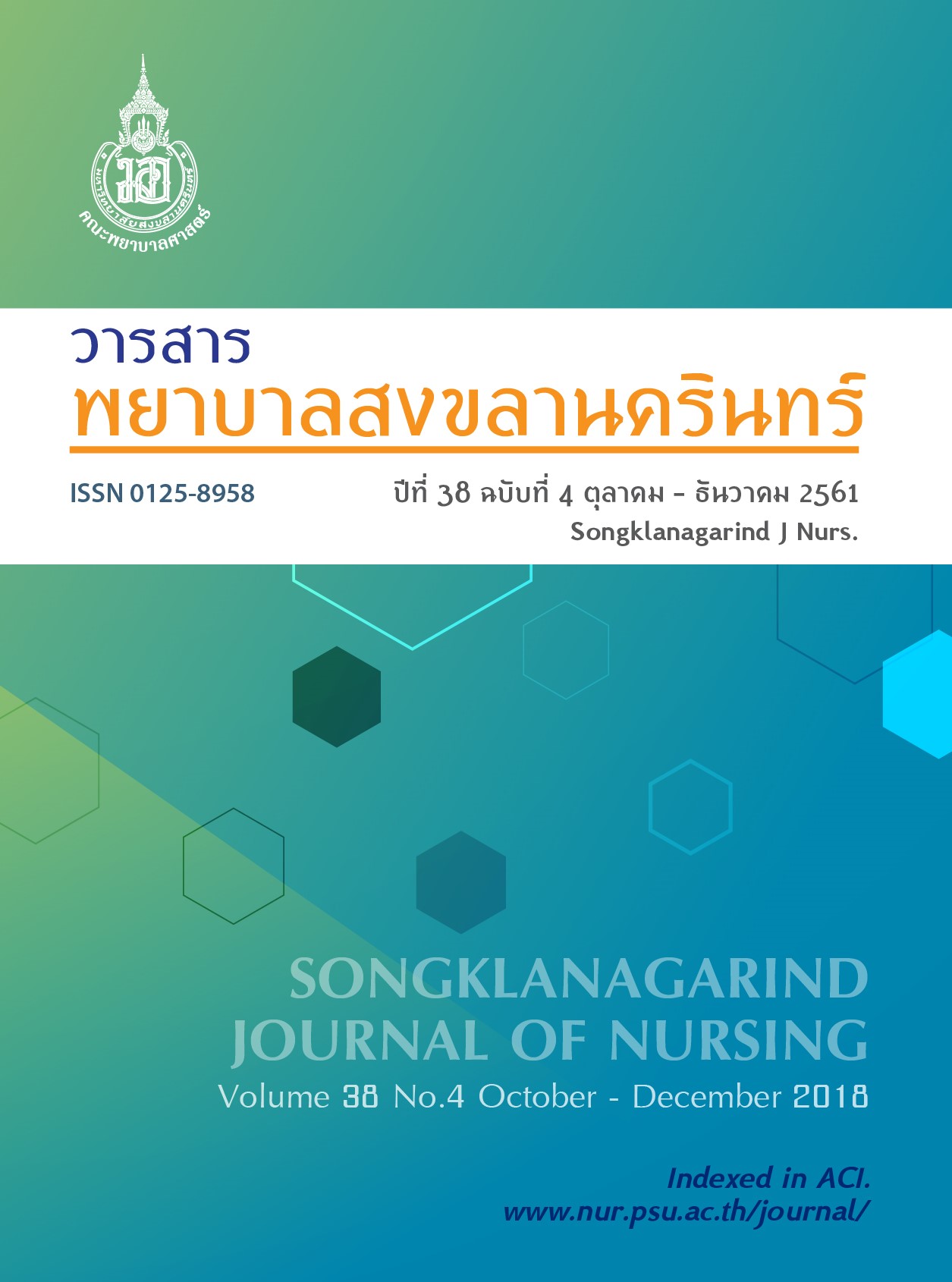สมดุลชีวิตนักศึกษามหาวิทยาลัยในภาคใต้
Main Article Content
บทคัดย่อ
การศึกษาวิจัยเชิงบรรยายนี้ มีวัตถุประสงค์เพื่อศึกษาระดับสมดุลชีวิตของนักศึกษามหาวิทยาลัยในภาคใต้ กลุ่มตัวอย่าง คือ นักศึกษาชั้นปีที่1 ปีการศึกษา 2559 ของมหาวิทยาลัยในภาคใต้แห่งหนึ่ง จำนวน 336 คน คัดเลือกกลุ่มตัวอย่างแบบหลายขั้นตอน เครี่องมือที่ใช้ในการวิจัยเป็นแบบสอบถาม ประกอบด้วย 2 ส่วน คือ แบบสอบถามข้อมูลทั่วไป และแบบสอบถามสมดุลชีวิต ซึ่งได้ผ่านการตรวจสอบความตรงตามเนื้อหาโดยผู้ทรงคุณวุฒิ จำนวน 3 ท่าน และได้นำไปทดสอบเพื่อหาค่าความเชื่อมั่นของเครื่องมือในกลุ่มตัวอย่างนักศึกษาที่มีคุณลักษณะคล้ายคลึงกัน จำนวน 30 ราย ได้ค่าความเชื่อมั่นสัมประสิทธิ์อัลฟ่าของครอนบาคของเครื่องมือเท่ากับ .91 วิเคราะห์ข้อมูลโดยใช้สถิติเชิงบรรยายและสถิติทดสอบทีอิสระ
ผลการศึกษา พบว่า ระดับสมดุลชีวิตของนักศึกษาโดยรวม และรายด้านทุกด้านอยู่ในระดับสูง โดยคะแนนเฉลี่ยสมดุลชีวิตโดยรวม เท่ากับ 3.79 (SD=0.40) ด้านการมีเป้าหมายในชีวิต เท่ากับ 3.92 (SD=0.45) ด้านการเข้าใจและยอมรับตนเอง เท่ากับ 3.75 (SD=0.45) ด้านการเข้าใจและยอมรับความจริงของชีวิต เท่ากับ 3.73 (SD=0.47) โดยค่าเฉลี่ยคะแนน ด้านการมีเป้าหมายในชีวิตมีค่าสูงที่สุด คะแนนเฉลี่ยสมดุลชีวิตโดยรวมและรายด้านทุกด้านของนักศึกษาชายและหญิงไม่แตกต่างกัน คะแนนเฉลี่ยสมดุลชีวิตด้านการเข้าใจและยอมรับตนเองของนักศึกษาวิทยาเขตหาดใหญ่และปัตตานีมีความแตกต่างกันอย่างมีนัยสำคัญทางสถิติ (t=3.40, p< .01) แต่คะแนนเฉลี่ยโดยรวม ด้านการมีเป้าหมายในชีวิต และด้านการเข้าใจและยอมรับความจริงของชีวิตไม่แตกต่างกัน ผลการศึกษาสามารถใช้เป็นข้อมูลพื้นฐานในการพัฒนาโปรแกรมส่งเสริมสมดุลชีวิต สำหรับนักศึกษามหาวิทยาลัย เพื่อส่งเสริมและคงไว้ซึ่งสมดุลชีวิตของนักศึกษาอย่างต่อเนื่อง
Article Details
เอกสารอ้างอิง
2. Yurayat P, Wong-in N, Kertpituk P, Pinyoanantakul B. A study and development of psychological well-being of university students. J of Science and Technology Mahasarakham University. 2011; 30(4): 420-31. Thai.
3. Chokevivat W. Knowledge set related to spiritual dimension related to health. Bangkok: Health Systems Research Institute; 2008. Thai.
4. Vajda, P. (2007). Are you living in harmony? [internet] Retrieved December 3, 2015 from http://www.managementissues.com/2007/10/29/opinion/are-you-living-in-harmony.asp
5. Office of the Education Council. Education development framework during economic and social development plan version 10 (2007-2016) [Summary version]. Bangkok: Chulalongkorn- University Printing House; 2008. Thai.
6. Bunlaead N. The adjustment of the first year undergraduate students of faculty of science at Burapha university [minor bachelor’s thesis]. [Chonburi]: Burapha University; 2011. 53 p.
7. Photong P, Phumphwng S, Khachat S. Stress adaptation and emotional intelligence of first year nursing students. J Phrapokklao Nurs College. 2011; 22(2): 49-62. Thai.
8. Treepatee S. Development and adaptation in adolescence [Internet]. Bangkok: Mahidol University; 2012 [cited 2017 Nov 5]. Available from: http://www.nicfd.cf.mahidol.ac.th/th/images/documents/3.pdf
9. Chaichompoo P. Factors affecting adjustment of Rajathani university students, Udonthani campus [master’s thesis]. [Khon Kaen]: Khon Khan University; 2006.
10. Gaytman P. Adolescent development.[Internet]. Bangkok [cited 2016 March 15]. Available from: http://www.psyclin.co.th
11. Suksawat J, Tuicomepee O. Violent experiences, coping with problems and happiness in the southern border provinces of Thailand: A preliminary mixedmethod research. J of Demography. 2010; 26(1): 22-46. Thai.
12. Udomsate O. Stress and stress management of school adolescents encountering the situation of unrest at Sabayoi district, Songkhla province [master’s minor thesis]. [Songkhla]: Prince of Songkla University; 2007. 91 p.
13. Tohkani M. Emotional problems and prosocial behavior of adolescents who encounter with unrest situation in three southern border provinces of Thailand. J Psychiatr Assoc Thailand. 2011; 56 (4): 363-75. Thai.
14. Panyayong B, Jantarasana S. Mental health problems among students in the area with continuous insurgency in the deep South of Thailand. J Ment Health Thai. 2009; 17(3): 1-11. Thai.
15. Phianjaruen P. Characteristics of students and reasons for studying at Prince of Songkla University, Pattani campus. ASJ PSU. 2010; 22(1): 117-127. Thai.
16. Wangmanee K. The development of happiness in Thai adolescents by self-help program [master’s thesis]. [Bangkok]: Srinakharinwirot University; 2011. 146 p.
17. Phobon B, Siwapaet S. Factors related to spiritual well-being of adolescents studying in secondary education level at Pakmaiwittayanukul school, Sisaket province. J of Edu. 2015; 9(2): 62-71. Thai.
18. Kamolsuk N. A causal factors influencing subjective well-being of undergraduates. Paper presented at: The 7th National and International Conference, Hatyai University. Proceeding of the 7th National and International Conference; 2016 Jun 23; Hatyai University, Thailand.
19. Kongthanaitthi B, Sudhasani S, Chadcham S. A causal relationship model of the subjective well-being of undergraduate students. Res Method & Cog Science. 2011; 8(2); 30-34. Thai.
20. Hashim S. Factors affecting happiness of higher education students in Pathum Thani province. SDU RES J. 2010; 6(1); 1-9. Thai.
21. Pacharprayoon C, Leisratdechakul C, Pattanapakdee N. Self-adjustment ability of first year students in public university. The Journal of KMUTNB. 2011; 21(1): 157-65. Thai.
22. Balthip, Q. Achieving harmony of mind: A grounded theory study of people living with HIV/AIDS in the Thai context [dissertation]. Palmerston North, Massey University, New Zealand; 2010. 301 p.
23. Yamane, T. Statistics: An introductory analysis. 3rd edition. New York: Harper and Row Publication; 1973.
24. Phasuksathaporn P, Chamroonsawasdi K, Nanthamongkolchai S, et al. Factors influencing on quality of life of early adolescents in Samutprakran province. J of Pub Health. 2010; 40(1): 29-39. Thai.
25. Gray R, Tongthai W, Suwannoppakao R. Happiness is universal. Bangkok: Charan Sanitwong Printing; 2010. Thai.
26. Walailak University. Student-centered learning [Internet]. Nakornsrithamarat: Walailak University; 2017 [cited 2017 Nov 7]. Available from: http://active learning.wu.ac.th
27. Prince of Songkla University. Student services and student welfare, Prince of Songkla University [internet]. Songkhla: Prince of Songkla University; 2017. [cited 2017 Nov 1]. Available from: http://student.psu.ac.th/web/home
28. Suwannakhot N, Wattananarong A, Sripairot N. The adjustment of the first year undergraduate students at Naresuan University. J of Educational Research Faculty of Education Srinakharinwirot University. 2013; 7(2):134-41.Thai.
29. Rodcumdee P. A model for developing wellness level of university students in Bangkok Matropolis [dissertation]. [Bangkok]: Chulalongkorn University; 1995. 234 p.
30. Pipatchukiat D. Factor related to wellness level of the first year undergraduate students of Thammasat university at Rangsit campus [master’s thesis]. [Bangkok]: Srinakharinwirot University; 1998.
31. Tawong S. Development of self esteem [Internet]. Bangkok: Sripatum University; 2007 [cited 2017 Nov 10]. Available from: http://dllibrary.spu.ac.th:8080/dspace/


